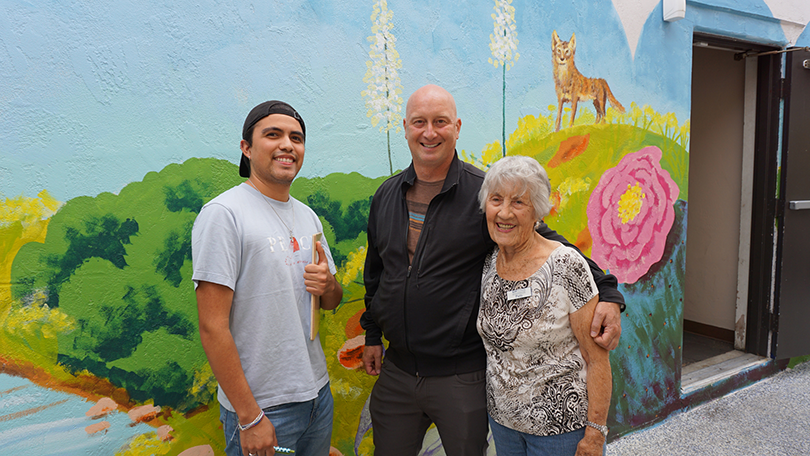Students ‘break bread’ with homeless communities in community engagement grant project
At the Uptown Community Service Center, students gain insights into challenges faced by unhoused individuals while exploring broader public policy reform.

Geography Lecturer Adam Pine’s goal is clear: make an impact in San Diego unhoused communities through service-learning experiences and classroom assignments. In his San Diego State University “Breaking Bread Project,” students participate in hands-on learning to explore the instability of food access and housing — all with the aim of driving positive and lasting change.
With the College of Arts and Letters Community Engagement Grant and Weber Honors College course enrichment funds, Pine partnered with the Uptown Community Service Center and affiliated organizations to help students learn how the unhoused are served and find ways to improve and implement assistance.
The CAL program promotes collaborations addressing needs and issues in local communities, research into new areas, and learning opportunities outside the classroom.
“This grant has allowed me to institutionalize community engagement in my courses, and provided a way to link my research with my teaching in very concrete ways,” said Pine.
His courses, Food, Place and Culture (GEO 342) and The Global Housing Crisis (HON 413), teach students about the intersections between food access and housing.
During four barbecues with the Uptown center last spring, Pine’s students cooked, organized clothes for the free clothing store, helped with registration and mail distribution, and made food and hygiene bags for distribution. Students took field notes, asked questions, and later synthesized their experiences into a class paper.
“A key insight from many of the papers was that experiences of homelessness were very individual and unique: some people were living in cars while others were living in shelters, and some people were working while others had health issues that kept them out of the labor force,” Pine said.
Pine and his research partner, Rebecca de Souza, professor and associate director of the SDSU School of Communication, conducted interviews with Uptown staff, volunteers and members. The interviews will be used to document the work of Uptown and guide future decisions of the organization.
“Adam’s work helps bridge quantitative and qualitative research but also puts a face to, and ideally better policy behind, a challenge that in San Diego and elsewhere is too often neglected or stereotyped,” College of Arts and Letters Dean Todd Butler said. “This sort of work matters, and it helps our college live up to its commitments and responsibilities to work for more than just ourselves.”
Experiential learning
Jacob Gallardo, a psychology major, picked Pine’s Housing Crisis course because he was curious about ongoing housing issues in San Diego. “The conversation only goes so far, and I really wanted to understand it.”
With the service portion of the class, Gallardo found connection.“It's just one of those things where you kind of have an inkling or a small passion for something to begin with, and then when there's just a great professor and great classmates, and you feel a taste of that work — it actually makes you feel connected to something.
“It's pretty common for a lot of us to be in jobs, in majors, in workplaces, or with friends, and not really know why we're doing it,” Gallardo added. “I feel like this class was a stepping stone toward all these things that I've been wanting to do.
Gallardo interviewed Patty Bender, 90, a longtime advocate and 15-year volunteer at Uptown who helps others navigate housing challenges. “I am a big believer that there is wisdom that needs to be passed down, and I learned a lot through her,” Gallardo said.
For Gallardo, the purpose of the class and service-learning is all about taking action. “Homeless people are people, and I think that it's a multilayered, complex thing, but I think that we need to care more. Sometimes that is just looking at your closet and seeing what you really don't need and giving it to them. ”
Another student, Meleana Love Suarez, a political science major, said“Uptown to me is more than just a place to give meals, but a place to recognize someone else’s struggles. To say, ‘I see you, I see the struggles you go through, I understand you,’ and even in your struggles, ‘I am here to serve you.’”
Service club
While working at Uptown, students bonded about how important it is to understand and learn from these communities. Love Suarez, Gallardo and classmate Hana Adan created HUMANKIND at SDSU to serve this community and engage other students in making a difference in it.
“We believe that change starts at our back door and that creating action stems from just a small group of people trying to spread awareness,” Love Suarez said. “Our club is more than just a club, but a call to action.”
For Love Suarez, the people at Uptown represented someone’s child that needed support. “I love this work not only because it makes me feel whole, but because I understand the pain of feeling like you have no one in life. Kindness can be a chain of reaction that creates sparks of love and understanding,” she said.
Gallardo sees proof that Bender’s motto: “If you see something, do something,” is alive in the actions of SDSU students.



